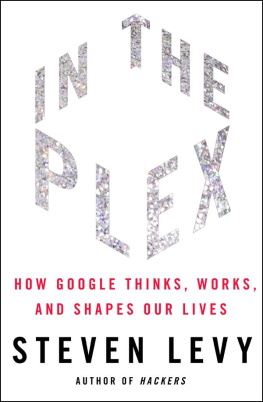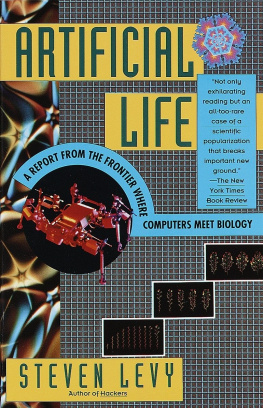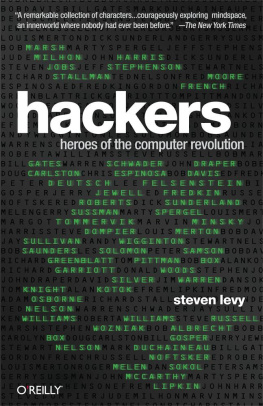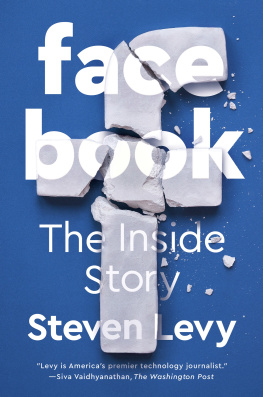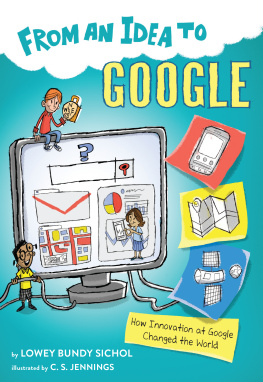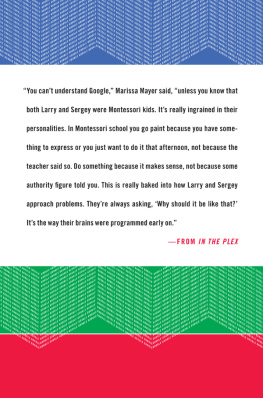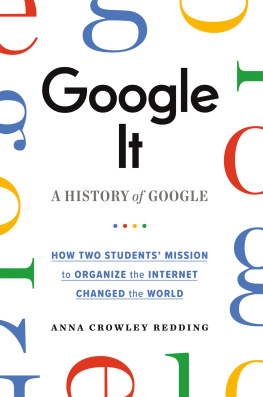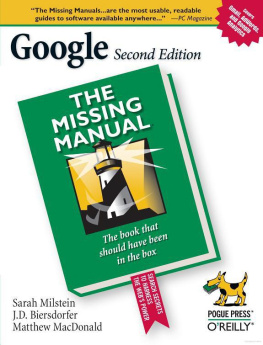


ALSO BY STEVEN LEVY
The Perfect Thing: How the iPod Shuffles Commerce, Culture, and Coolness
Crypto: How the Code Rebels Beat the Government
Saving Privacy in the Digital Age
Insanely Great: The Life and Times of Macintosh,
the Computer That Changed Everything
Artificial Life: The Quest for a New Creation
The Unicorns Secret: Murder in the Age of Aquarius
Hackers: Heroes of the Computer Revolution

Simon & Schuster
1230 Avenue of the Americas
New York, NY 10020
www.SimonandSchuster.com
Copyright 2011 by Steven Levy
All rights reserved, including the right to reproduce this book or portions thereof in any form whatsoever. For information address Simon & Schuster Subsidiary Rights Department, 1230 Avenue of the Americas, New York, NY 10020
First Simon & Schuster hardcover edition April 2011
SIMON & SCHUSTER and colophon are registered trademarks of Simon & Schuster, Inc.
The Simon & Schuster Speakers Bureau can bring authors to your live event.
For more information or to book an event contact the Simon & Schuster Speakers
Bureau at 1-866-248-3049 or visit our website at www.simonspeakers.com.
Designed by Ruth Lee Mui
Manufactured in the United States of America
10 9 8 7 6 5 4 3 2 1
Library of Congress Cataloging-in-Publication Data
Levy, Steven.
In the plex : how Google thinks, works, and shapes our lives / Steven Levy.
1st Simon & Schuster hbk. ed.
p. cm.
Includes bibliographical references and index.
1. Google (Firm). 2. Google. 3. Internet industryUnited States. I. Title.
HD9696.8.U64G6657 2011
338.7'6102504dc22 2010049964
ISBN 978-1-4165-9658-5
ISBN 978-1-4165-9671-4 (ebook)
Contents
In memory of Philip Klass (19202010)
PROLOGUE
SEARCHING FOR GOOGLE
It was a blazing hot July day in 2007, in the rural Indian village of Ragihalli, located thirty miles outside Bangalore. Twenty-two people from a company based in Mountain View, California, had driven in SUVs and vans up an unpaved road to this enclave of seventy threadbare huts with cement floors, surrounded by fields occasionally trampled by unwelcome elephants. Though electricity had come to Ragihalli some years earlier, there was not a single personal computer in the community. The visit had begun awkwardly, as the outsiders piled out of the cars and faced the entire population of the village, about two hundred people, who had turned out to welcome them. It was as if these well-dressed Westerners had dropped in from another planet, which in a sense they had. Young schoolchildren were pushed forward, and they performed a song. The visitors, in turn, gave the children notebooks and candy. There was an uncomfortable silence, broken when Marissa Mayer, the delegations leader, a woman of thirty-two, said, Lets interact with them. The group fanned out and began to engage the villagers in awkward conversation.
That is how Alex Vogenthaler came to ask a spindly young man with a wide smile whether he had heard of Google, Vogenthalers employer. It was a question that he would never have had to ask in his home country: virtually everyone in the United States and everywhere in the wired-up world knew Google. Its uncannily effective Internet search product had changed the way people accessed information, changed the way they thought about information. Its 2004 IPO had established it as an economic giant. And its founders themselves were the perfect examples of the superbrainy engineering mentality that represented the future of business in the Internet age.
The villager admitted that, no, he had never heard of this Google. What is it? he asked. Vogenthaler tried to explain in the simplest terms that Google was a company that operated on the Internet. People used it to search for information. You would ask it a question, and it would immediately give you the answer from huge repositories of information it had gathered on the World Wide Web.
The man listened patiently but clearly was more familiar with rice fields than search fields.
Then the villager held up a cell phone. Is this you what mean? he seemed to ask.
The little connectivity meter on the phone display had four bars. There are significant swaths of the United States of America where one can barely pull in a signalor gets no bars at all. But here in rural India, the signal was strong.
Google, it turns out, was on the verge of a multimillion-dollar mobile effort to make smart phones into information prostheses, adjuncts to the human brain that would allow people to get information to a vast swath of all the worlds knowledge instantly. This man might not know Google yet, but the company would soon be in Ragihalli. And then he would know Google.
I witnessed this exchange in 2007 as an observer on the annual trip of Google associate product managers, a select group pegged as the companys future leaders. We began our journey in San Francisco and touched down in Tokyo, Beijing, Bangalore, and Tel Aviv before returning home sixteen days later.
My participation on the trip had been a consequence of a long relationship with Google. In late 1998, Id heard buzz about a smarter search engine and tried it out. Google was miles better than anything Id used before. When I heard a bit about the sites method of extracting such good resultsit relied on sort of a web-based democracyI became even more intrigued. This is how I put it in the February 22, 1999, issue of Newsweek: , draws on feedback from the web itself to deliver more relevant results to customer queries.
Later that year, I arranged with Googles newly hired director of corporate communications, Cindy McCaffrey, to visit its Mountain View headquarters. One day in October I drove to 2400 Bayshore Parkway, where Google had just moved from its previous location above a Palo Alto bicycle shop. Id visited a lot of start-ups and wasnt really surprised by the genial chaosa vast room, with cubicles yet unfilled and a cluster of exercise balls. However, I hadnt expected that instead of being attired in traditional T-shirts and jeans, the employees were decked out in costumes. I had come on Halloween.
Steven, meet Larry Page and Sergey Brin, said Cindy, introducing me to the two young men who had founded the company as Stanford graduate students. Larry was dressed as a Viking, with a long-haired fur vest and a hat with long antlers protruding. Sergey was in a cow suit. On his chest was a rubber slab from which protruded huge, wart-specked teats. They greeted me cheerfully and we all retreated to a conference room where the Viking and the cow explained the miraculous powers of Googles PageRank technology.
That was the first of many interviews I would conduct at Google. Over the next few years, the company became a focus of my technology reporting at Newsweek. Google grew from the small start-up I had visited to a behemoth of more than 20,000 employees. Every day, billions of people used its search engine, and Googles remarkable ability to deliver relevant results in milliseconds changed the way the world got its information. The people who clicked on its ads made Google wildly profitable and turned its founders into billionairesand triggered an outcry among traditional beneficiaries of ad dollars.
Next page
